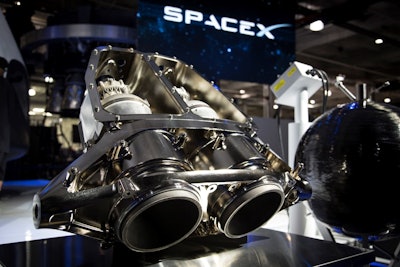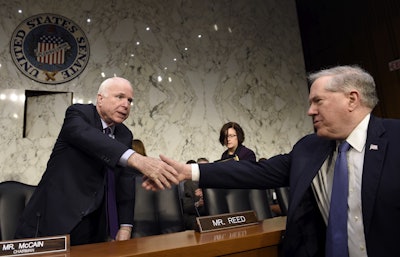
Senior Pentagon officials on Wednesday sought to defend the use of Russian-made rocket engines to send U.S. military satellites into space, telling exasperated lawmakers they are moving quickly to end the practice and rely on American-made rockets for the launches.
But Air Force Secretary Deborah James and Pentagon acquisition chief Frank Kendall failed to stem sharp criticism from several members of the Senate Armed Services Committee who view Russia as the chief geopolitical threat to the United States.
Led by the committee chairman, Sen. John McCain, R-Ariz., they said using the Russian engines enriches President Vladimir Putin's inner circle and puts U.S. national security in jeopardy.
McCain, his voice rising at times, asked James and Kendall if they knew the names Sergey Chemezov and Dmitry Rogozin. Both are Russians targeted by U.S. sanctions, he said, yet their positions in Russia's space and defense industry allows them to personally profit from the sales of the Russian RD-180 engines. Each engine costs roughly $30 million.
"So we now have senior Russian politicians, friends of Vladimir Putin, that are making tens of millions dollars in the pass-through money that is paid for the Russian rocket engines," McCain said. He asked James whether she found that disturbing.
 Senate Armed Services Committee Chairman Sen. John McCain, R-Ariz., left, shakes hands with Defense Undersecretary Frank Kendall, the military's chief weapons buyer, right, before the start of a hearing on Capitol Hill in Washington, Wednesday, Jan. 27, 2016, on Russian-made rockets for military satellites. At a committee hearing, McCain said Russia holds many of the United States' "most precious national security satellites at risk before they ever get off the ground." (AP Photo/Susan Walsh)
Senate Armed Services Committee Chairman Sen. John McCain, R-Ariz., left, shakes hands with Defense Undersecretary Frank Kendall, the military's chief weapons buyer, right, before the start of a hearing on Capitol Hill in Washington, Wednesday, Jan. 27, 2016, on Russian-made rockets for military satellites. At a committee hearing, McCain said Russia holds many of the United States' "most precious national security satellites at risk before they ever get off the ground." (AP Photo/Susan Walsh)"Yes," James responded, although she said she couldn't be certain whether any Russian officials were directly benefiting from the sales.
Disengaging from use of the Russian engines is a priority but also far more complicated than it appears, James said. She recommended a stockpile of 18 of the RD-180s until an equally capable American-made space launch vehicle can be tested and fielded.
James also said she asked senior Pentagon officials on Wednesday to work with other federal agencies to ensure that purchase of the engines does not conflict with U.S. sanctions.
The Pentagon has actively tried to undermine the committee's direction to limit that risk and end the use of the Russian RD-180 engines by the end of this decade, McCain said. He also blamed the U.S. contractor that acquires the engines, United Launch Alliance, and two senators who support the company, Richard Shelby, R-Ala., and Dick Durbin, D-Ill., for thwarting the committee's instructions.
McCain and House Majority Leader Kevin McCarthy, R-Calif., intended to introduce legislation Thursday to repeal a provision in law that they said allows the unlimited acquisition and use of RD-180 engines, which are made by NPO Energomash. The manufacturer is owned primarily by the Russian government and controlled by several of Putin's closest confidants, according to the lawmakers.
United Launch Alliance is under contract with the Air Force to launch military and spy satellites. The purchases effectively reward Putin's inner circle even as Washington continues to condemn Russia's invasion of Ukraine's Crimea region, its continued support for Syrian President Bashar Assad, and other hostile actions, the lawmakers said.
Yury Melnik, a spokesman for the Russian Embassy in Washington, said Russia considers congressional discussions about the RD-180 "an internal U.S. matter" and would not comment on "specific remarks by different lawmakers."
 The proposed ban would prevent the United Launch Alliance from bidding on military work, leaving SpaceX as the sole source of engines. (Image credit: SpaceX)
The proposed ban would prevent the United Launch Alliance from bidding on military work, leaving SpaceX as the sole source of engines. (Image credit: SpaceX)United Launch Alliance spokeswoman Jessica Rye said the company had no comment.
The debate over the Russian equipment also illustrates a longstanding tension between congressional committees that have similar yet distinct responsibilities. McCain's panel is an authorization committee that writes defense policy and approves annual military spending levels. But the appropriations committees actually allot the money, and their actions can occasionally contradict what the authorizers decided.
During a December floor speech, McCain said Shelby and Durbin, both senior members of the Senate Appropriations Committee, reversed a restriction on buying the engines in what McCain called a "triumph of pork-barrel parochialism." Their provision was added — "in secret, with no debate," McCain said — to a $1.1 trillion government-wide spending bill passed by Congress late last year and signed into law by President Barack Obama.
United Launch Alliance, which uses the RD-180s on its Atlas V launch vehicle, has manufacturing facilities in Decatur, Alabama. Defense industry giants Boeing, based in Chicago, and Lockheed Martin formed United Launch Alliance as a joint venture. Shelby, who faces a GOP primary challenge, helped craft the spending bill but then ended up voting against it because the bill didn't tighten the vetting process for Syrian refugees seeking to enter the United States.
Over the past two years, McCain said, his committee supported measures also approved by Congress that prohibited the Russian engines but allowed a small number to be used during the transition period if the engines were fully paid for before Feb. 1, 2014 — just weeks before Russia invaded Ukraine.
Durbin, also speaking on the Senate floor last month, said nothing was done in secret. He said Defense Department officials told him and other lawmakers that excluding the Russian engines so quickly could leave the Air Force short of all the rockets needed to launch satellites. Durbin also said it prevents United Launch Alliance from bidding on military work, leaving the company SpaceX as the "monopoly source for the engines."
SpaceX, a rocket and spacecraft manufacturing company, is based in Hawthorne, California, McCarthy's home state.


















